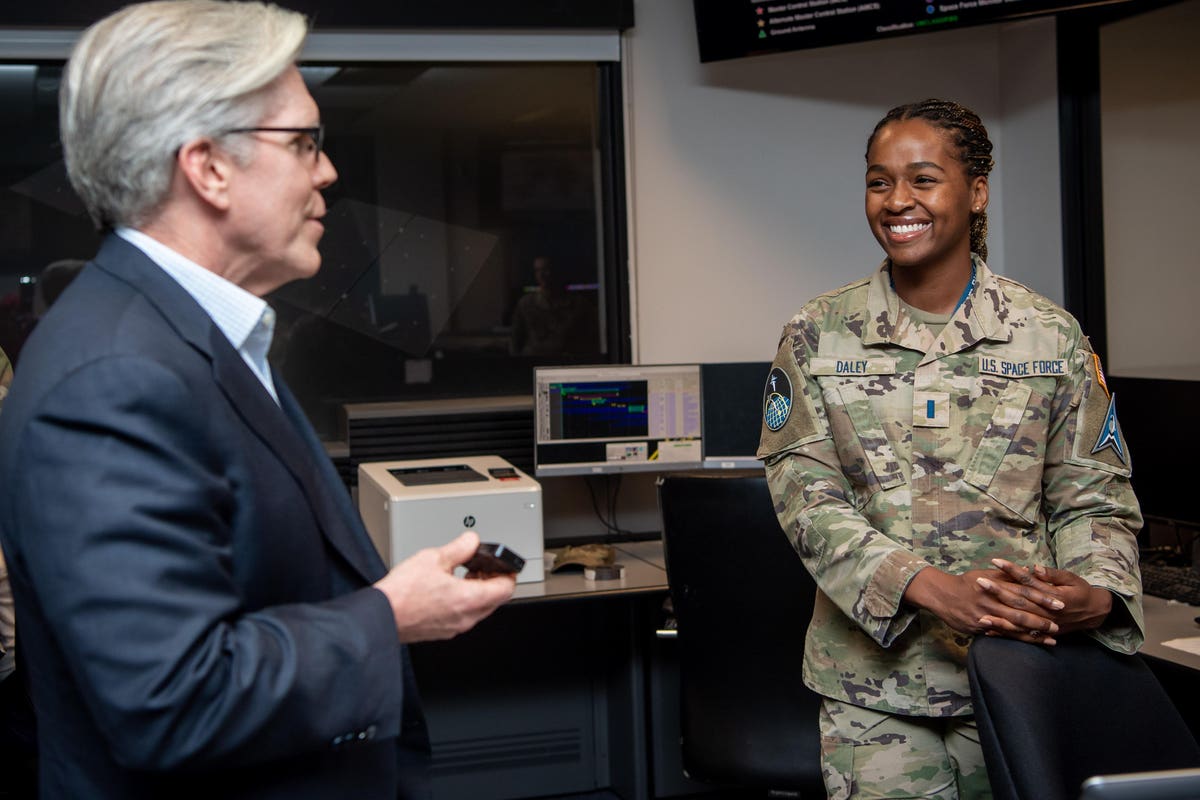Of all the missions the Space Force performs daily for a grateful nation, there is none more ubiquitous and essential than GPS. Today’s soldiers and sailors depend on reliable, accurate, and secure GPS as much as they do any weapon they employ. Meanwhile, the rest of the world is just as dependent on GPS to enable basic mobility and underpins every other sector of the modern global economy. The criticality of secure global navigation and timing to both warfighting and the national economy makes it unique – we simply could not go a day without space. In so few words, GPS’ future is ground zero for the new space race.
The 2 SOPS or 2nd Space Operations Squadron commander, Lt Col Robert Wray reminds me that “14 of the 16 critical infrastructures designated by the Department of Homeland Security rely on 24/7 GPS to operate for the country.” But the newest GPS satellites in use today are the same school bus sized ones Gen. Hyten has lamented are, “juicy targets” for our adversaries – marvels of modern engineering, yes, but no longer sufficient to meet modern needs.
Alternatives to GPS, categorically called Global Navigation Satellite Systems (GNSS), are growing rapidly because the old GPS system we rely on offers neither the precision nor security needed in an increasingly autonomous, rule based, and precisely timed world. What exactly needs to change then, aside from smaller, faster satellites as technology becomes more efficient and readily available? There are major challenges with the current system that today’s Guardians are already working on. But to usher in a new and improved GPS capability, the government needs to adopt artificial intelligence and machine learning to enhance squadron operations, work to better integrate commercial software into current GPS constellation to get the most out of current capabilities, and continue to invest in the next generation of leaders. Private capital has begun aligning with companies aiming to solve these future deficiencies, in a race against pacing threats like China and Russia. The next generation must move even faster to keep up and eventually lead.
Geolocation from space ushered in 30 years ago enabled the explosion of rideshare companies and made Rand McNally obsolete. But now current GPS technology is just not precise enough for the autonomous future coming our way both militarily and on your smart phone. As impressive as 2 SOPS and the Guardians serving are, it needs to go through its own autonomy revolution, much like the industries it underpins – transportation and financial sectors, for example – are already attempting. This will require incorporating artificial intelligence and machine learning tech at a rate the department acknowledges it is way behind and slow to adapt to. For the Space Force, Gen. Saltzman believes that a service’s first priority must be to assure dominance in the domain it occupies. But what was key to guiding a Cold War bomber through a nuclear winter is now highly vulnerable to 21st century cyber hacking tools that can be procured on the web. When GPS’ new ground system is eventually fielded, it should fix some of the cybersecurity vulnerabilities, but it will have nothing close to the zero-trust technology that the White House has directed and the warfighter desperately needs for mission assurance.
As the future direction of the Space Force calls into focus a Hybrid Space architecture, commercially available products and services must be leveraged and promoted to ensure all US space industry resources are brought to bear in today’s space race against our near peer competitors. There are scores of companies that are ready to help, and this new generation of openminded Guardians have the technical and business savviness to lead these changes.
One of the new emerging Guardian leaders is 1st Lt Sana Daley. An Air Force Academy graduate with a degree in astronautical engineering, Daley is one in a crew shift of 10 who operate the GPS constellation and epitomizes each of the self-assured, friendly, and sophisticated Guardians I met. With a self confidence that only comes from real accomplishments like designing and building real satellites as a cadet, she is already the chief of the GPS payload itself – all 31 birds orbiting 12,000 miles above us. They perform their mission differently than the other services, Daley says, “the engineers are expected to perform critical thinking and real engineering analysis to do their jobs” in the squadron. She is excited about the Space Force bringing active-duty software experts called “supra coders” to work directly with the ops crew to identify and solve software problems on orbit as they occur, and then relay those fixes back to Space Systems Command. For Lt Daley, there is no room for error, especially with the oldest satellites now over 26 years old. Yet she remains cool and confident on the ops floor, just as comfortable explaining and performing her job as she is telling me about growing up in Snellville, Georgia.
Lt Daley and her crewmates at 2 SOPS should inspire us all. While the senior most government officials debate and relitigate decisions made over the last 30 years since GPS went operational, we can take comfort in the fact that we have a new generation of Space professionals dedicated to this vital mission and rising quickly to lead us into the space century.
On my visit, Col. Wray reminded me again of Gen. Saltzman’s promise that the “Space Force will be there to protect and enable America’s interests in space, wherever they are.” There are major changes necessary to bolster our current GPS system – from modernization of the software and hardware itself, to the acquisition climate supporting its creation and supporting infrastructure, even down to those individuals running the program. Luckily for us (and if Lt. Daley is any indication), the newest breed of military member is arriving just in time to save us from ourselves – so that we’ll hopefully never know a day without space.
Read the full article here





